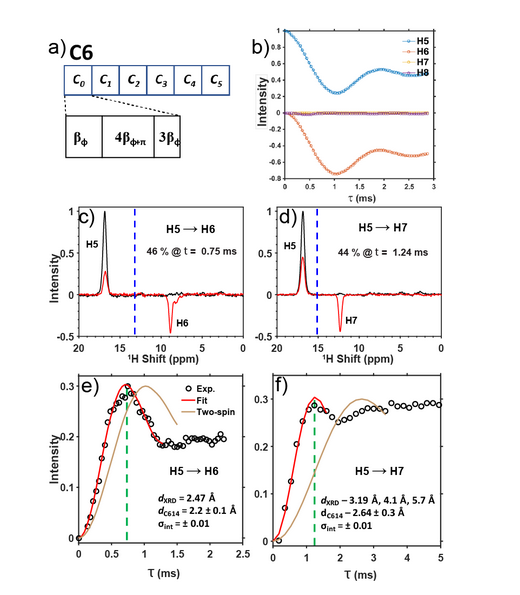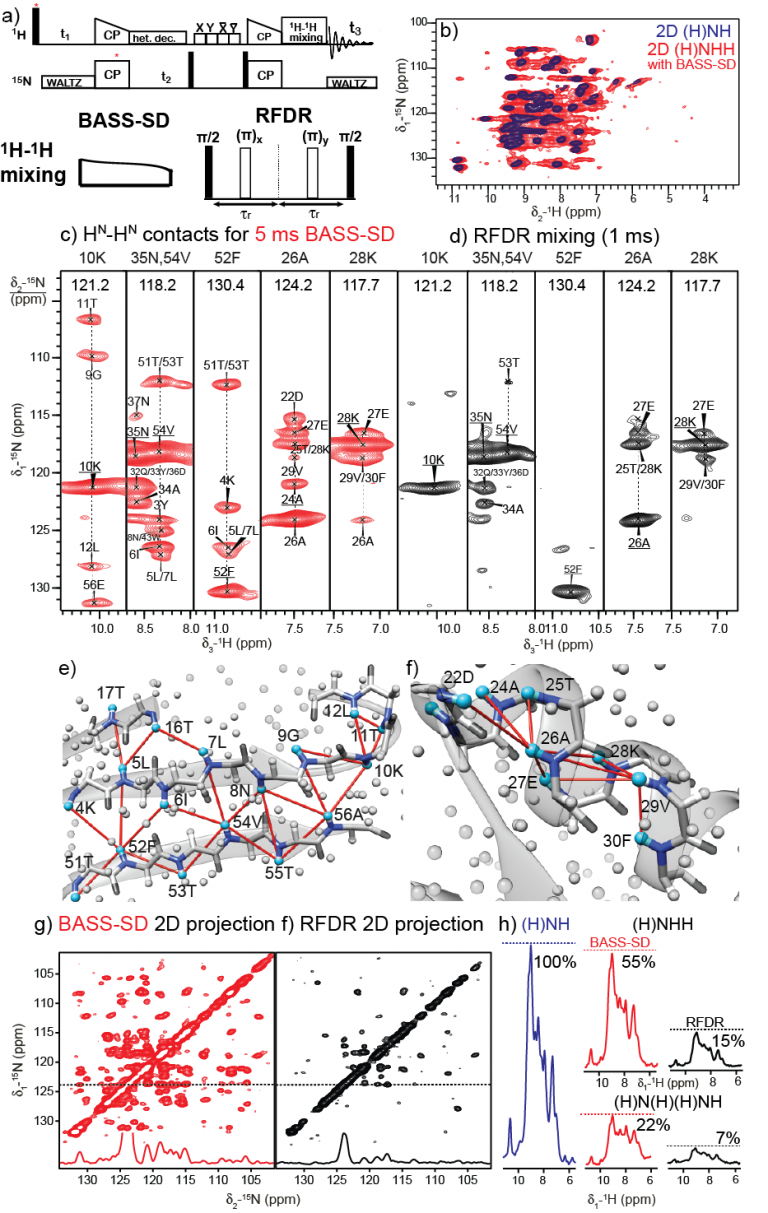Measurement of 1H-1H distances
Solid-state NMR has had considerable success in the structure determination of perdeuterated proteins. However, one would like to use a fully protonated protein samples for various reasons. we have developed new 1H-1H recoupling sequences that selectively recouple protons in the solid-state. In fully protonated molecules, SERP can be used to measure quantitative 1H-1H distances while BASS-SD is used to observe 1H-1H structural restraints similar to those observed only in perdeuterated proteins with protons at selective sites.
Selective1H-1H recouplingbased onCNnvsequences
The CN symmetry sequences,routinely used in solid-state NMR, rely on the rotation properties of spatial and spin tensors.Symmetry sequences are used to efficiently recouple any anisotropic interaction via a suitable choice of N, n and nu symmetry numbers. We modified the sequences to evolves the isotropic chemical shift during recoupling while the symmetry numbers ensure that only the DQ dipolar terms are symmetry allowed in the first-order Hamiltonian. Similar to SERP, the dipolar Hamiltonian is modulated by isotropic chemical shifts. Selective recoupling for a spin pair is achieved by setting the transmitter offset at the center of the two proton resonances. More than 30 homonuclear CNnvsequences were evaluated through simulations in terms of the scaling factor, selectivity, and polarization transfer efficiency. A major advantage of symmetery sequence over SERP is that rf requirements are only 50% of the MAS frequency and transfer efficiencies are two to three-fold higher. Selective C641has a narrower bandwidth than SERP recoupling and therefore is more selective than SERP sequences. These sequences were also applied for the measurement of 1H-1H contacts in fully protonated samples. The influence of the other proton makes it challenging to determine 1H-1H distances using the modified C641sequence.

Selective Recoupling of Protons (SERP)
SERP is a phase-modulated recoupling sequence to selectively and quantitatively measure magnetic dipole-dipole interaction between protons at fast MAS. The recoupling conditions of numerically optimized SERP have been explained in the framework of the bimodal Floquet theory with two characteristic frequencies spinning frequency and the modulation frequency of the pulse sequence.17-20 The effective recoupled Hamiltonian consists of isotropic chemical shift and DQ dipolar-coupling terms. This is a time-dependent Hamiltonian and is not suitable for recoupling. Selective recoupling between two proton spins is achieved by setting the transmitter offset to the center of the two proton-resonances, thereby ensuring that the isotropic chemical shift term for the two protons is eliminated. Under this condition, only the dipolar coupling term between the two protons is time-independent and can be used to measure the1H-1H dipole coupling. In a two-spin system, SERP recoupling has an efficiency of ~53%


Transfer of magnetization during SERP recoupling from HNA46→ HαF45/A46. The HN A46 distances to the two Hα are similar and the Hα chemical shift is overlapped. A simulation (HNA46→ HαF45/A46, black solid line) was performed with the distances obtained from X-ray structure and plotted with a similar build up obtained from experiments (filled circles). The maxima were artificially scaled to overlap. Spectra obtained from SERP mixing at two different conditions on Ubiquitin
This project has been in collaboration with Dr. Yusuke Nishiyama of JEOL-Japan.
Band Selective Spectral Spin-Diffusion (BASS-SD) is a method to obtain selective1H-1H contacts between chemically similar protons such as HN-HN/Hα-Hα/Hmethyl-Hmethylin the range of 5-6Å despite the presence of other protons at shorter distances in fully protonated proteins. In fully protonated samples, BASS-SD gives correlations similar to those observed in perdeuterated samples with protons located at selective sites. BASS-SD recoupling combines low-power spin-lock pulse on protons with fast MAS to enable the selective exchange of polarization amongst protons (e.g. selective HN-HNtransfer). Bimodal Floquet analysis was used to understand the mechanism of polarization transfer. The analysis shows that second-order cross-terms between two homonuclear dipolar couplings mediate polarization transfer during BASS-SD recoupling. Simultaneously, the isotropic chemical shifts in the first-order Hamiltonian provide the selectivity . The selectivity is essential to observe selective HN-HN/Hα-Hα/Hmethyl-Hmethylcorrelation.

Figure a) pulse sequence for the 3D (H)NHH experiment b) Overlay of 2D (H)NH (Blue) and 2D (H)N(H)H-BASS-SD (Red) spectra. c-d) HN-HN restraints from 3D (H)N(H)(H)NH spectra of fully protonated U-[13C,15N]-GB1 at 111.11 kHz MAS with c) BASS-SD (red, 5 ms) and d) RFDR ( black, 1 ms) mixing. Observed HN-HN correlations across the e) β-sheet and f) α-helix motifs are mapped on the X-ray structure of GB1 (PDB code: 2QMT). Cyan and grey spheres denote amide and other protons, respectively, while the dark gray and blues sticks represent the backbone atoms. 2D 15N-15N positive projections from the 3D spectra are shown in g) for BASS-SD and h) RFDR, i) 15N- filtered 1D proton intensity comparison after RFDR and BASS-SD mixing for different experiments.
Relevant Publications:
- Mukul G Jain, Daniela Lalli, Jan Stanek, Chandrakala Gowda, Satya Prakash, Tom S. Schwarzer, Tobias Schubeis, Kathrin Castiglione, Loren B. Andreas, P.K. Madhu, Guido Pintacuda and Vipin Agarwal,Selective 1H-1H Distance Restraints in Fully Protonated Proteins by Very Fast Magic Angle Spinning Solid-State NMR J. Phys. Chem. Lett., 8, 2399-2405 (2017)
- Nghia Tuan Duong, Sreejith Raran-Kurussi, Yusuke Nishiyama, and Vipin Agarwal Quantitative 1H-1H Distances in Protonated Solids by Frequency Selective Recoupling at Fast Magic Angle Spinning NMR . J. Phys. Chem. Lett., 9, 5948-5954 (2018)
- Lokeswara Rao Potnuru,Nghia Tuan Duong, Sahil Ahlawat, Sreejith Raran-Kurussi, Matthias Ernst, Yusuke Nishiyama and Vipin Agarwal Accuracy of 1H-1H distances measured using frequency selective recoupling and fast Magic Angle Spinning. J. Chem. Phys. (Sep, 2020)
- Nghia Tuan Duong, Sreejith Raran-Kurussi, Yusuke Nishiyama, and Vipin Agarwal, Can proton-proton recoupling in fully protonated solids provide quantitative, selective and efficient polarization transfer? J. Magn.Reson., 317, 10677 (2020)
- Lokeswara Rao Potnuru, Nghia Tuan Duong,Sahil Alhawat, Sreejith Raran-Kurussi, Matthias Ernst, Yusuke Nishiyamaand Vipin Agarwal Accuracy of Quantitative 1H-1H distances measured in fully Protonated solids using frequency selective recoupling. Chem. Phys., 153(8) 084202 (2020)
- Lokeswara Rao Potnuru, Nghia Tuan Duong,Sreejith Raran-Kurussi,Yusuke Nishiyama and Vipin Agarwal Selective1H-1H recoupling via symmetry-based sequences in fully protonated solids at Fast Magic Angle Spinning.J. Magn. Reson., 328, 107004 (2021)
- Sahil Ahlawat, Kaustubh R. Mote, Sreejith Raran-Kurussi and Vipin Agarwal Mechanism of polarization exchange amongst chemically similar and distinct protons during weak rf irradiation at fast magic angle spinning Resn. 340, 107236 (
